5 Best PHP Hosting Providers in 2024
If you click to purchase a product or service based on our independent recommendations and impartial reviews, we may receive a commission. Learn more
Understanding your web hosting requirements is crucial, especially if you want to use PHP scripts to build a booming site that attracts visitors. Since PHP scripts run only on servers capable of interpreting that language, choosing the best web host for the job makes a difference.
To help you minimize frustrations and leverage all the perks of PHP, we’ve pulled together a list of the best PHP hosting providers based on power and affordability. We’ve analyzed top features, PHP specifications, and “bang for your buck” potential. Get ready to find customizable and affordable PHP hosting plans that you can start using with confidence.
Top 5 PHP Hosting Providers
- Bluehost – Best Overall PHP Hosting Provider
- SiteGround – Best for Highly Secure PHP Features
- Hostinger – Best for Affordability and Bandwidth
- WP Engine – Best for Business Growth and Scalability
- HostPapa – Best for Hands-On Customer Support
Our team has conducted extensive research on the best PHP hosting providers in today’s web development marketplace. We’ve carefully examined each provider’s performance in several important areas: affordability, uptime, PHP capabilities, and customer support.
#1 - Bluehost
5 out of 5 stars
Best Overall PHP Hosting Provider
Overall rating — 4.8/5
| Pros | Cons |
|---|---|
| 30-day money-back guarantee | Limited basic plan that caps growth |
| Free SSL certificates | Additional features easily add up $ |
| Reliable uptime when tested | Promotional prices typically expire |
Bluehost is well-known for its uptime, long list of industry-leading features, and user customizations. Beginners and experienced pros alike turn to Bluehost for its simplicity and reliability over time. Additionally, Bluehost grows to scale for personal and professional sites, including online storefronts.
Plans and Pricing
PHP hosting on Bluehost starts at $1.99 per month, billed annually. Users can choose from Basic, Choice Plus, Online Store, or Pro.
Given its limited storage space of 10GB, the Basic plan is best suited for very simple websites. We recommend the Choice Plus plan as the best starting point for PHP users, due to the plan’s additional features (like Domain Privacy and malware scanning) and power for the cost. The Online Store and Pro plans are ideal for growing businesses.
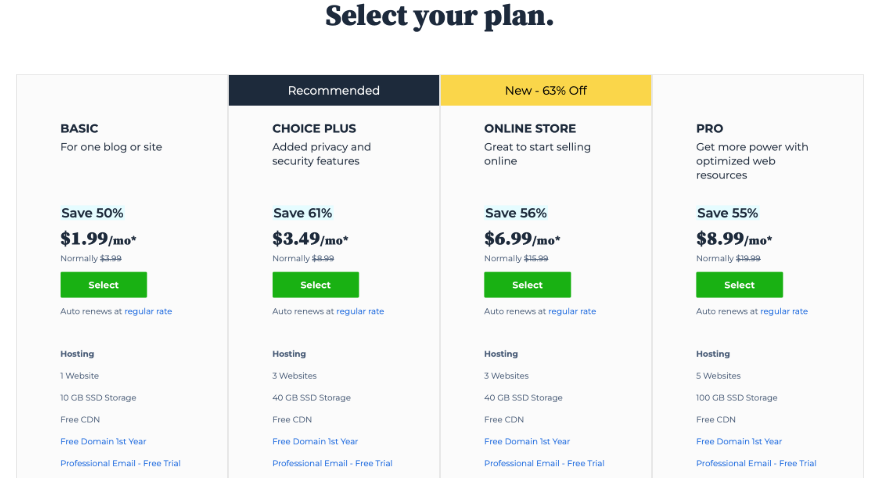
Performance and Reliability
Bluehost publicizes a strong uptime record, which ensures that PHP applications are available when users need them. (In our Bluehost review, however, we found that Bluehost’s promises fell slightly short of advertised speed and dependability.)
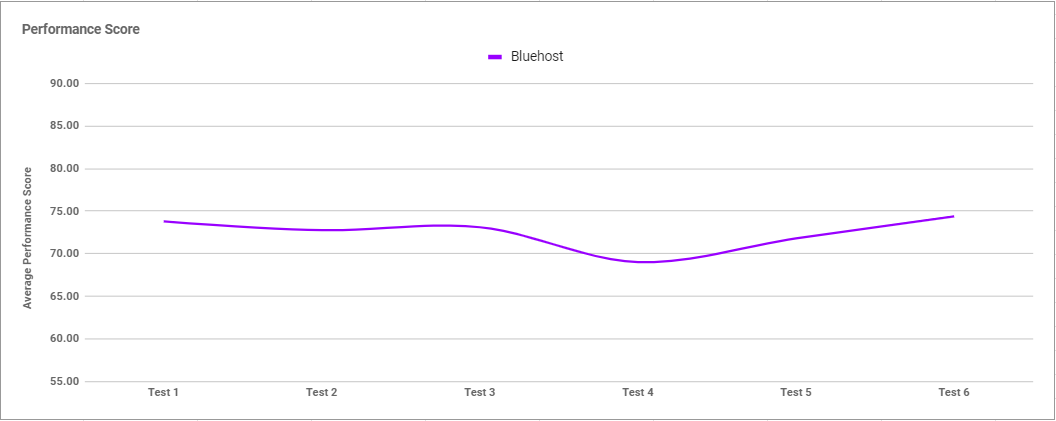
Compatibility and Support for PHP Versions
Full support for multiple PHP versions allows developers to run various applications efficiently.
According to Bluehost’s most recent help documents, Bluehost recommends upgrading to PHP versions 8.1 and higher. You can customize your version with PHP handlers and configure the environment using the service’s MultiPHP Manager within the platform’s Account Manager.
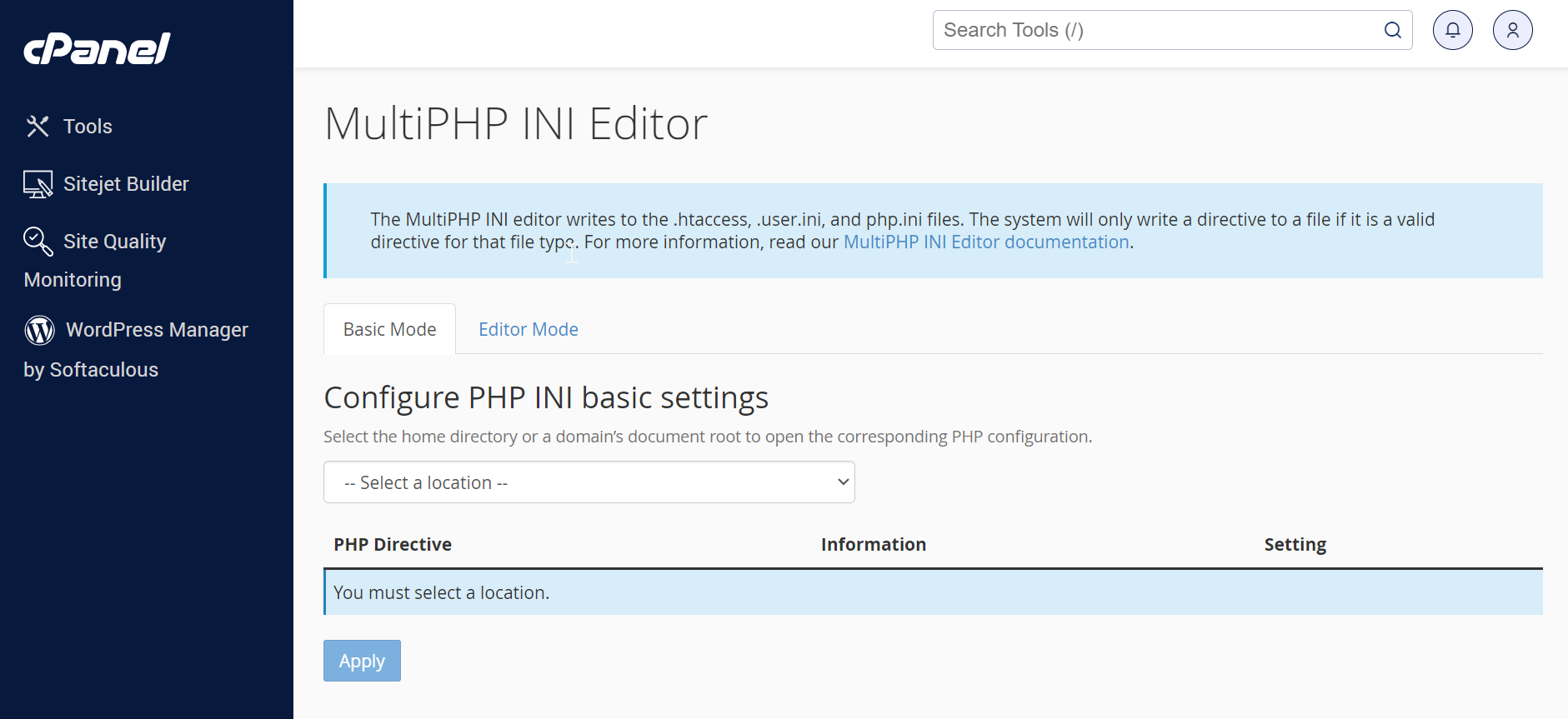
Security Measures
Bluehost’s hosting plans include extensive security measures, such as a free SSL certificate, daily data backups, Secure Shell access, and SpamAssassin protection. You’ll need to upgrade to at least the Choice Plus plan for bonus features, such as Domain Privacy and malware scanning.
Who Is Bluehost For?
| Recommended For | Not Recommended For |
|---|---|
| Beginners looking for low-risk blog hosting options | Enterprise users with substantial budgets |
| Users who want to create simple blogs or forums | Ecommerce site owners with large scale operations |
💡 Explore our Bluehost price guide and Bluehost review to decide which plan is right for you.
#2 - SiteGround
4 out of 5 stars
Best for Highly Secure PHP Features
Overall rating — 4.0/5
| Pros | Cons |
|---|---|
| Daily backups | Limited storage space |
| 24/7 phone and live chat support | No email support option |
| Ecommerce-friendly hosting | Performance varies widely by industry |
SiteGround is known for its superior customer service, daily backups, and exceptional server speed. If finding a sustainable solution is important for your PHP hosting needs, SiteGround also has a 100% renewable energy match on its PHP shared hosting plans.
Plans and Pricing
SiteGround offers PHP hosting on all of its shared hosting plans, ranging from $2.99 to $7.99 per month, billed annually. The StartUp plan is the most affordable option at $2.99 per month, offering basic features such as 10GB of storage space, daily backups, and unmetered traffic. Unlike Bluehost, you can set up an online store with any of SiteGround’s plans without having to pay extra.
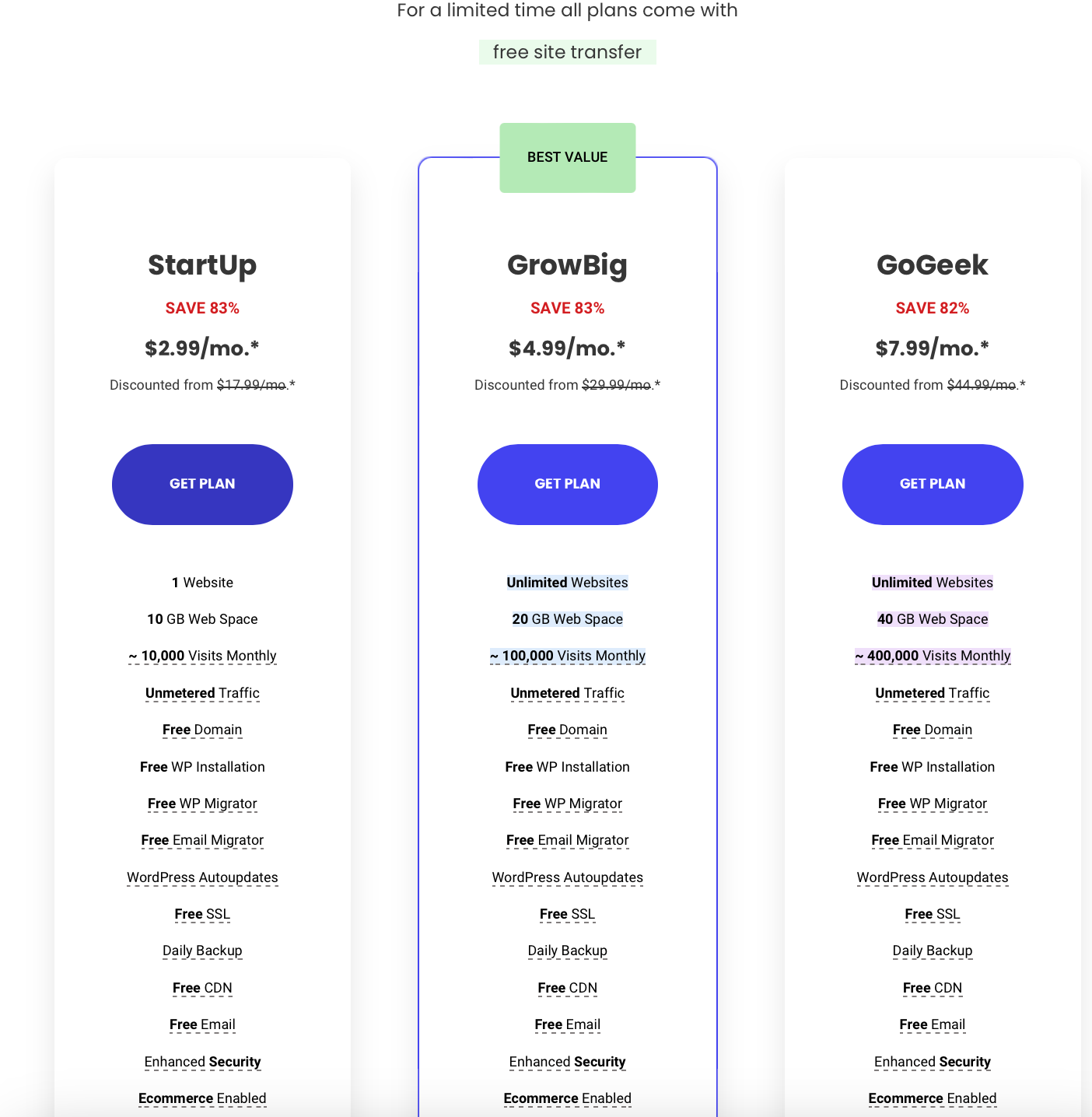
Performance and Reliability
With a strong emphasis on speed, SiteGround guarantees excellent website performance, even up to hundreds of thousands of monthly visits. When users upgrade to the GrowBig and GoGeek plans, SiteGround also boasts a 30% faster PHP. According to SiteGround, the platform’s ultrafast PHP implementation cuts the TTFB (time to first bite), which allows servers to process more visits faster.
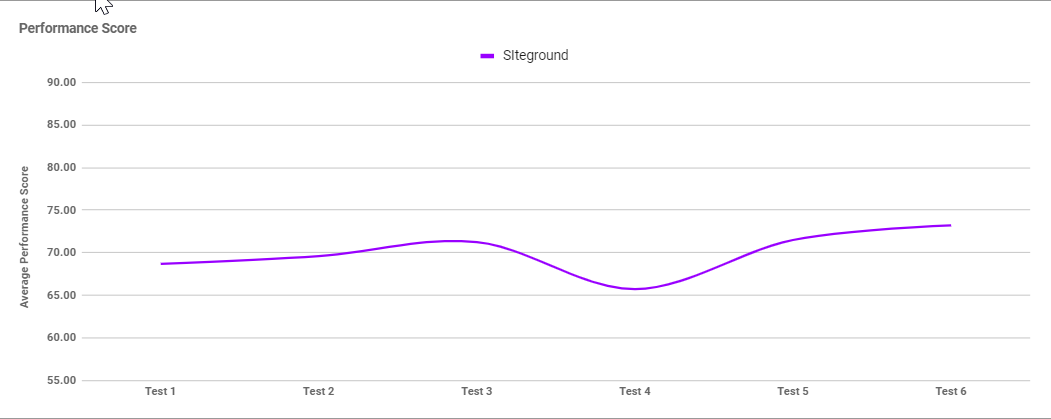
Compatibility and Support for PHP Versions
SiteGround maintains continuous updates to support the latest PHP versions, offering cutting-edge performance to users who run on PHP scripts.
We uncovered one major selling point for those interested in this host. SiteGround automatically updates PHP sites once the platform knows that the next version is reliable and safe. This benefit alone can save plenty of time and effort for busy developers.
Users of outdated PHP versions (7.3 and below) should note that SiteGround has phased out server support for these versions.
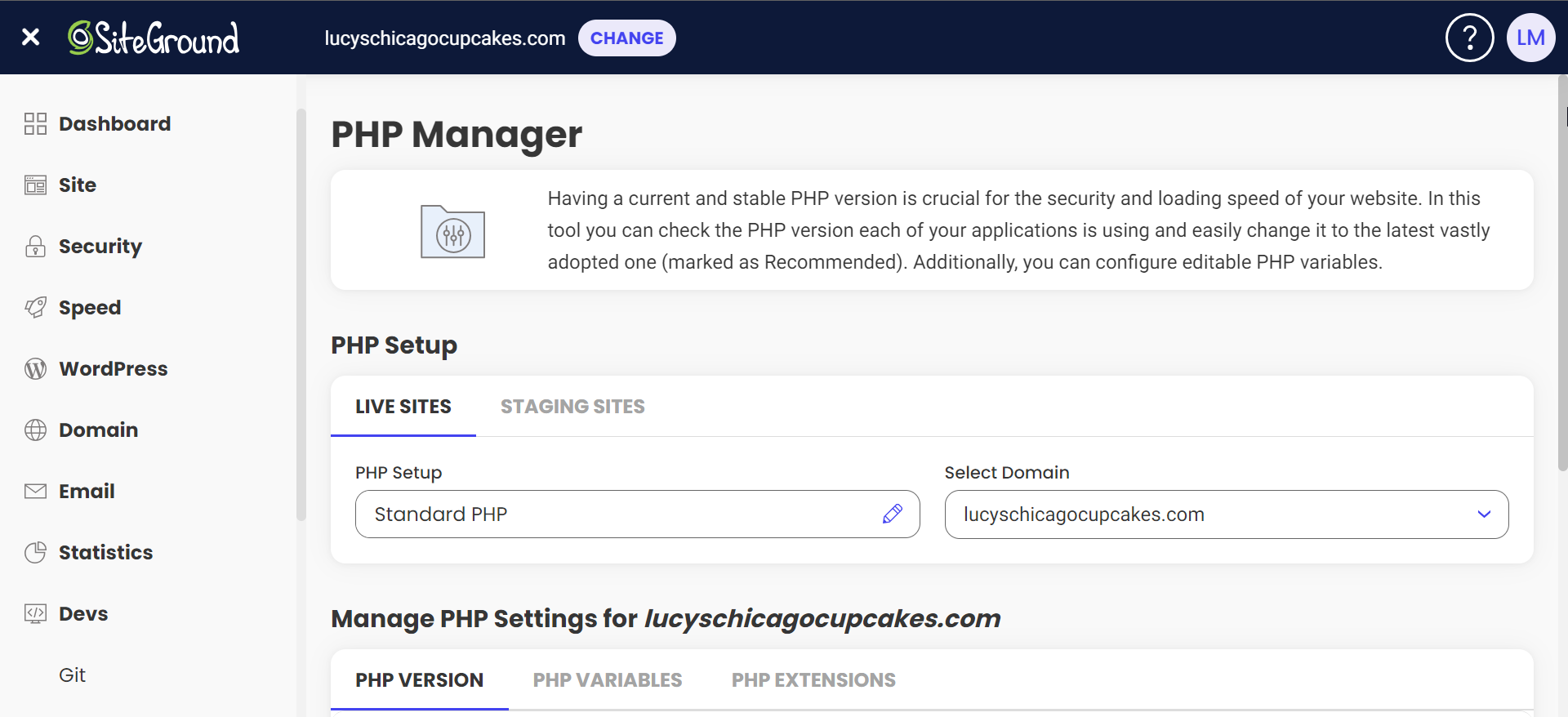
Security Measures
SiteGround’s security measures include free SSL, free daily backups, and 24/7 server monitoring. It also runs an Intrusion Prevention System to identify users trying to steal website passwords. The system also disables attacker access to prevent further harm.
Who Is SiteGround For?
| Recommended For | Not Recommended For |
|---|---|
| PHP developers that want automatic site updates with new versions | Users who need VPS or dedicated hosting |
| Users that want storage space over 40GB per website | Site owners who need the highest server response times |
💡 Don’t miss our comprehensive SiteGround review to learn more about this user-focused platform.
Torn between our top two PHP hosts? Check out our SiteGround vs Bluehost comparison to help you choose.
#3 - Hostinger
4 out of 5 stars
Best for Affordability and Bandwidth
Overall rating — 3.7/5
| Pros | Cons |
|---|---|
| Cheapest plans and unlimited bandwidth | No phone support |
| Unlimited SSL certificates | Daily backups include an extra charge |
| 24/7 live chat and email support | No easy scalability beyond VPS plans |
Hostinger is a web service provider with highly competitive subscription rates and a user-friendly control panel. For users on a budget, Hostinger introduces a cost-conscious way to get unlimited traffic bandwidth and GIT integration, with hands-on support.
Plans and Pricing
Hostinger offers three PHP hosting plans: Single, Premium, and Business. The cheapest plan starts from $2.49 per month on a promotional offer based on a 48-month term. (The annual billing price is $2.99 per month) Of course, if you commit to a longer subscription, hosting could cost as little as $1.99 per month for your initial term. As a result, we’ve named Hostinger the most affordable option on the PHP hosting providers list.

Performance and Reliability
In our in-depth research process, we did find that Hostinger fell short of its stated uptime goals. Although Hostinger advertises 99.9% uptime, this seemed to be a mighty promise that didn’t live up to the hype, which could have bigger implications for ecommerce sites. If you’re interested in saving money by using Hostinger, keep this possible trade-off in mind.
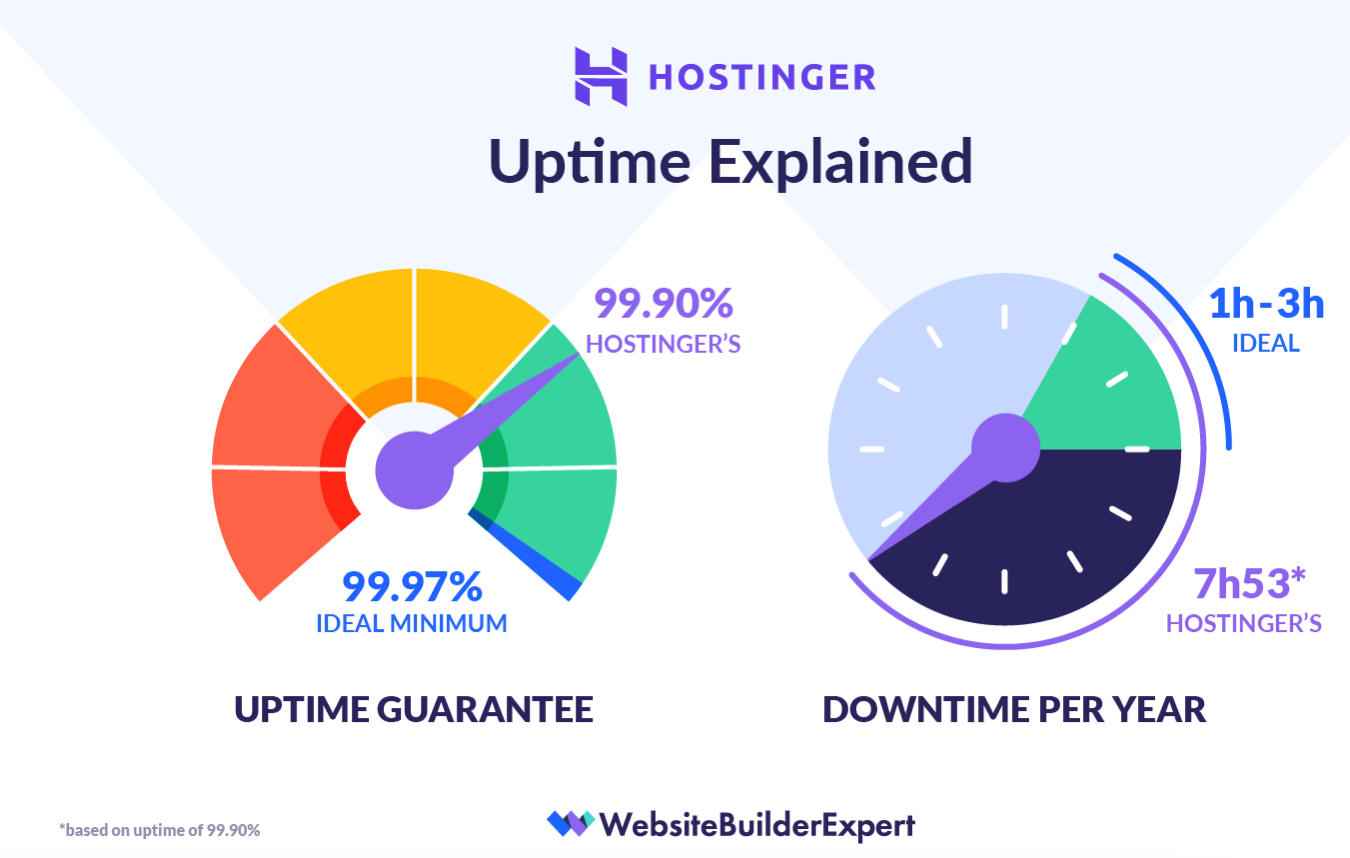
Compatibility and Support for PHP Versions
Hostinger clearly knows that users want and need to use PHP for site development. Its detailed and practical PHP help documents and blogs are some of the most simple that we’ve encountered. Hostinger also supports a PHP configuration tool that lets WordPress users make critical updates without harming an existing site.
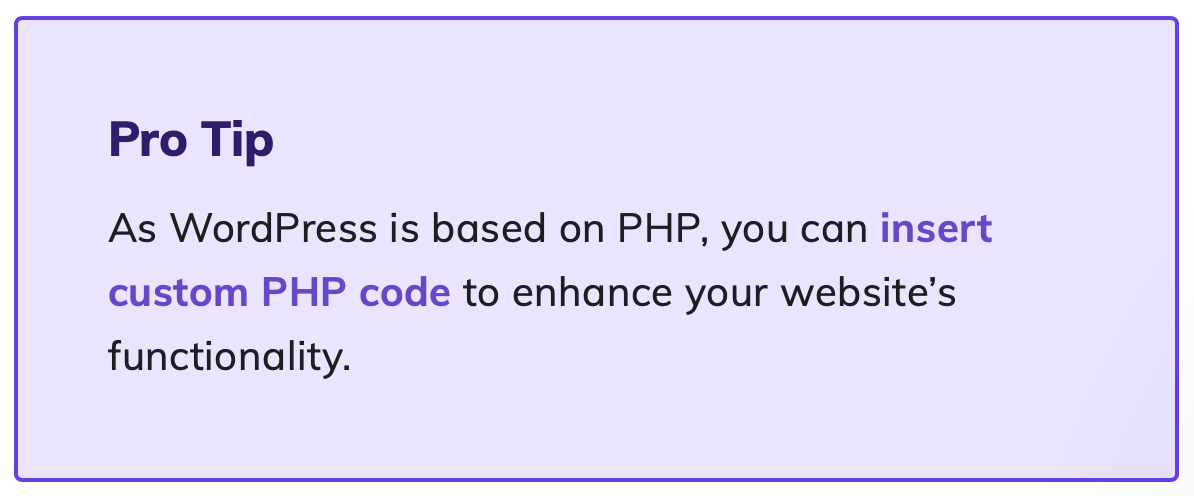
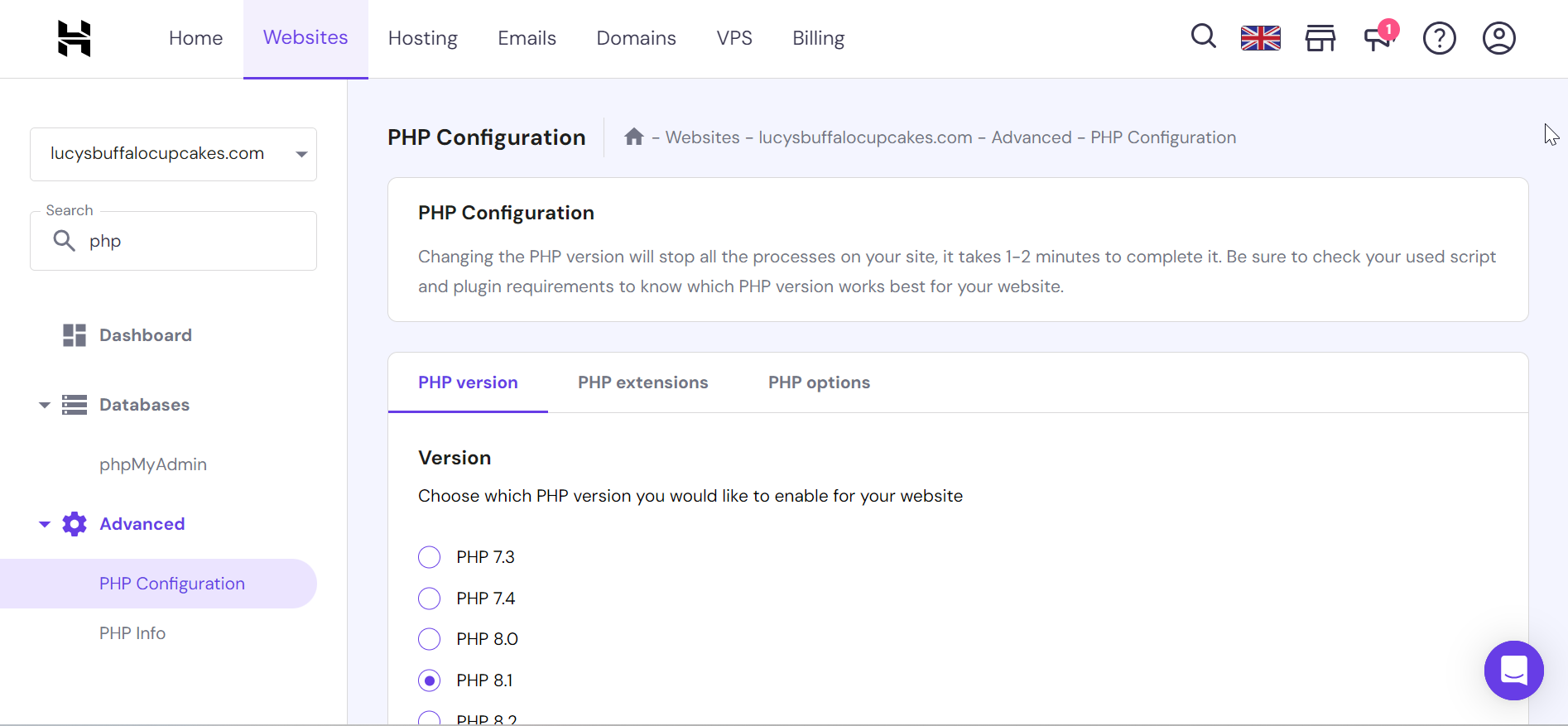
Security Measures
Hostinger includes unlimited free SSL certificates across all of its PHP hosting plans. All plans include a custom firewall, Cloudflare protected nameservers, malware scans, and a secure access manager. Depending on your plan level, you’ll get weekly or daily site backups.
Who Is Hostinger For?
| Recommended For | Not Recommended For |
|---|---|
| Site owners who need the most affordable PHP hosting choice | Users who need VPS or dedicated hosting |
| Ecommerce shop owners looking to maintain both a site and store | Customers looking for premium features at a built-in price |
| Developers that want to migrate an existing site to a cheaper host |
💡 The full Hostinger hosting review can help you decide if it’s right for your website.
#4 - WP Engine
3.5 out of 5 stars
Best for Business Growth and Scalability
Overall rating — 3.5/5
| Pros | Cons |
|---|---|
| User-friendly for WordPress users | Only includes basic and introductory features |
| 24/7 phone, live chat, email support | Expensive plans more suitable for business |
| Built-in WP Health Tool for site safety | Not for personal sites |
WP Engine is unique in that it specifically caters to WordPress users looking for business growth. But, while it provides specialized hosting for WordPress users, it also limits who can use the service.
Because it’s pricey, we’d recommend WP Engine for organizations ready for expansion as opposed to small businesses looking to be resourceful. On the other hand, if you run a smaller WordPress site, our recommendation for Bluehost still stands. That’s because Bluehost is more affordable and manageable for creators and developers who are just getting started or working with a smaller budget.
Plans and Pricing
WP Engine now offers four WordPress hosting plans, plus a custom enterprise plan (called Custom). Premium plans range between $20 per month to $77 per month, billed annually. While the Professional and Growth plans are a more sizable investment, they’re worth considering if you have a large-scale website that brings in ample traffic.
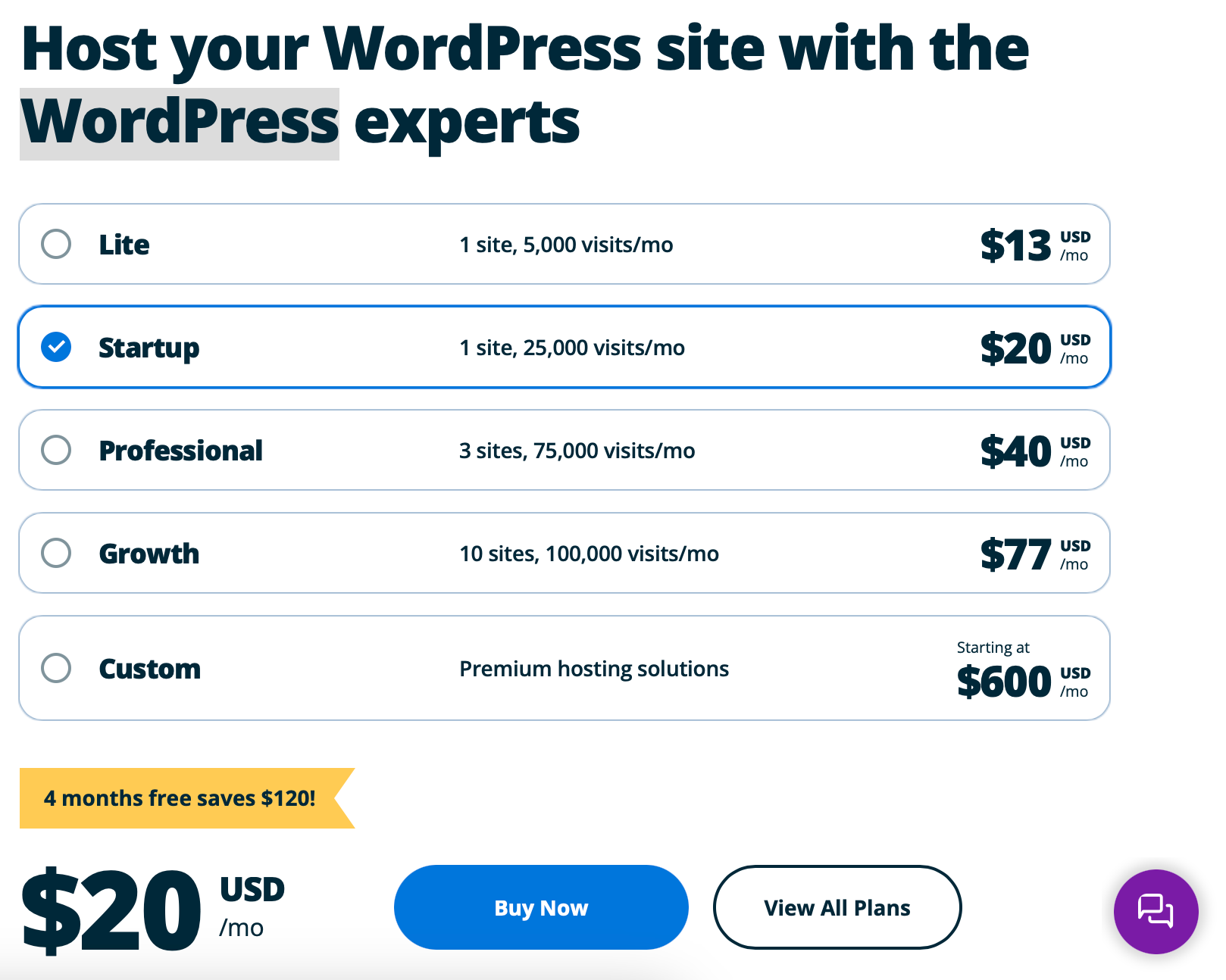
Performance and Reliability
When you invest in a top-tier solution like WP Engine, you should be able to expect solid uptime. Our research suggests WP Engine’s uptime is close to 99.95%, which equates to a little over four hours of downtime every year. In terms of capability, you can see that every WP Engine plan includes flexible tools and automations that make site management easier.

Compatibility and Support for PHP Versions
WP Engine claims that “50% of WordPress sites run a PHP version that is already end of life, meaning it’s no longer supported or patched for security vulnerabilities.” As a result, WP Engine encourages users to use the platform’s WP Health Tool to check website versions and ensure safety.
The PHP Selector tool helps site managers streamline the PHP update process and troubleshoot known issues.
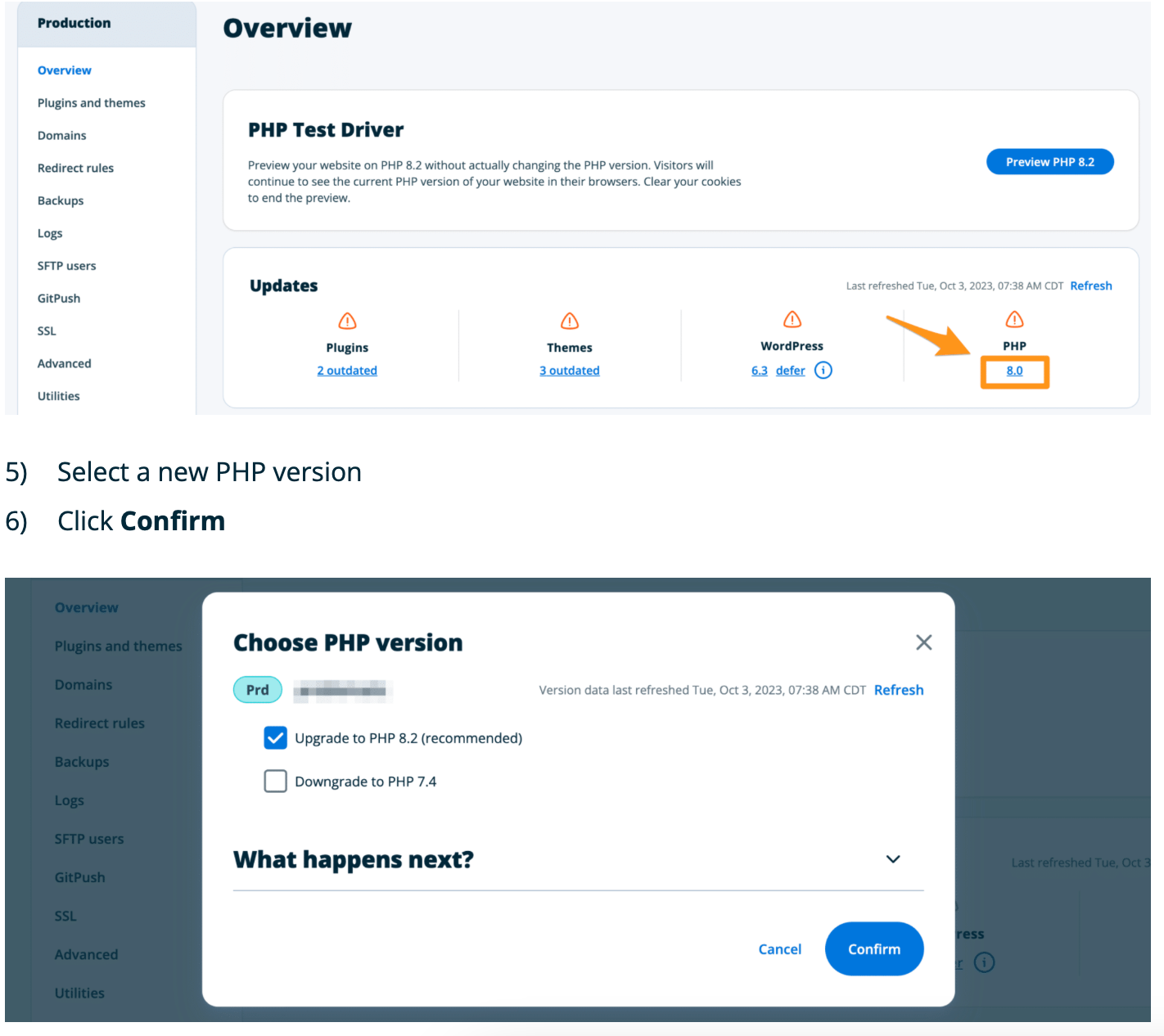
Security Measures
WP Engine’s security measures include a proprietary firewall to automatically direct good, bad, and malicious traffic appropriately. PHP hosting plans provide disk write protection to keep known, harmful code from embedding itself into a website.
Who Is WP Engine For?
| Recommended For | Not Recommended For |
|---|---|
| Site owners that need expanded options for VPS hosting | Beginner or basic users that need introductory pricing and features |
| Developers prioritizing security of a major, high-traffic website | Basic users who may already self-host their own sites |
💡 If you’re looking to grow, cover all the bases with our WP Engine Review.
#5 HostPapa
3.5 out of 5 stars
Best for Hands-On Customer Support
Overall rating — 3.2/5
| Pros | Cons |
|---|---|
| Highly affordable hosting plans | No email support |
| 30-day money-back guarantee | Premium security features cost more |
| Free SSL certificate | No free daily backups like competitors |
HostPapa is ideal for small businesses, and the platform is recognized for its commitment to sustainable web hosting. According to our research, HostPapa’s PHP-supporting plans include free domain registration and unmetered bandwidth or traffic. Even the least expensive plans include a whopping 100GB of storage space, with upgrades available for more value. Compare this to SiteGround’s highest plan tier, which only offers 40GB of web space per site.
HostPapa plans provide a suite of core features, like cPanel access to help you manage your website with ease, streamlined WordPress installation, and a 99.9% uptime guarantee.
Plans and Pricing
HostPapa’s four shared PHP hosting plans start at $2.95 per month (a 77% savings when billed on a three-year discounted term). The Pro plan, which includes top features and the highest savings percentage, comes in at $5.95 per month with a three-year commitment.
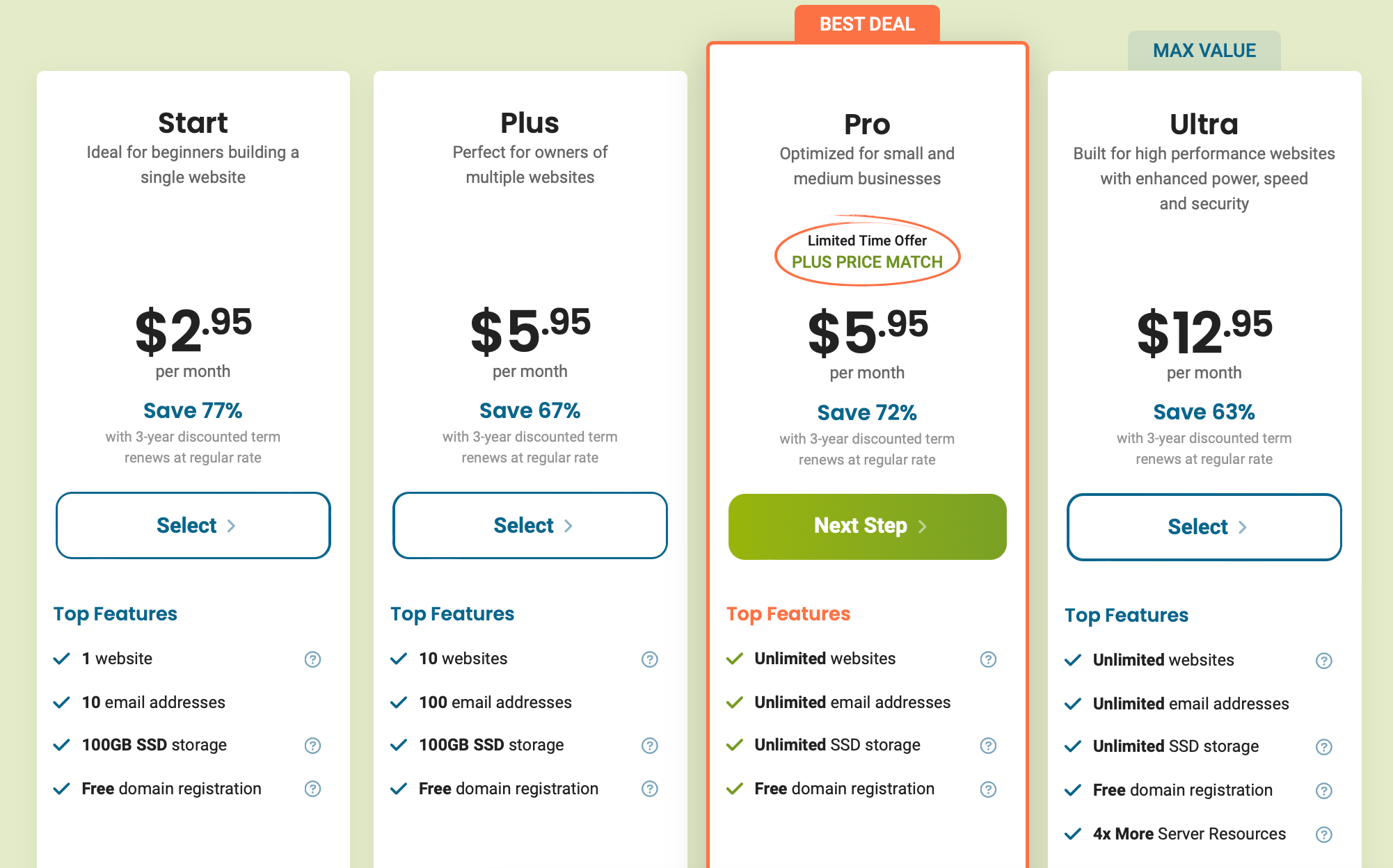
Like other providers, HostPapa distinguishes between shared hosting and WordPress hosting, which includes more customization, reliability, and better performance. While there’s no right or wrong choice, users who want added protection and customer-facing reliability can opt for WordPress hosting.
Performance and Reliability
HostPapa’s uptime is about 99.96%—a decent result for such an affordable plan. According to our research, that equates to less than three hours of downtime every year.
Compatibility and Support for PHP Versions
HostPapa’s customer support and knowledge base include many PHP articles and tutorials for those who are barely familiar or looking to learn more.
It appears that HostPapa currently supports PHP 5.6, 7.0, 7.2, 7.3, 7.4, 8.0. Despite the fact that users can still access older versions, industry best practices state that developers should update to current, safer versions as soon as possible.
Security Measures
Every HostPapa plan includes a free SSL certificate. However, additional privacy and security features, such as automated backups and website monitoring are only included in the Pro plan and above. According to our research, HostPapa includes pricey add-ons (like “Protection Power Website Security”) that provide more protection—even if they sound a bit ambiguous.
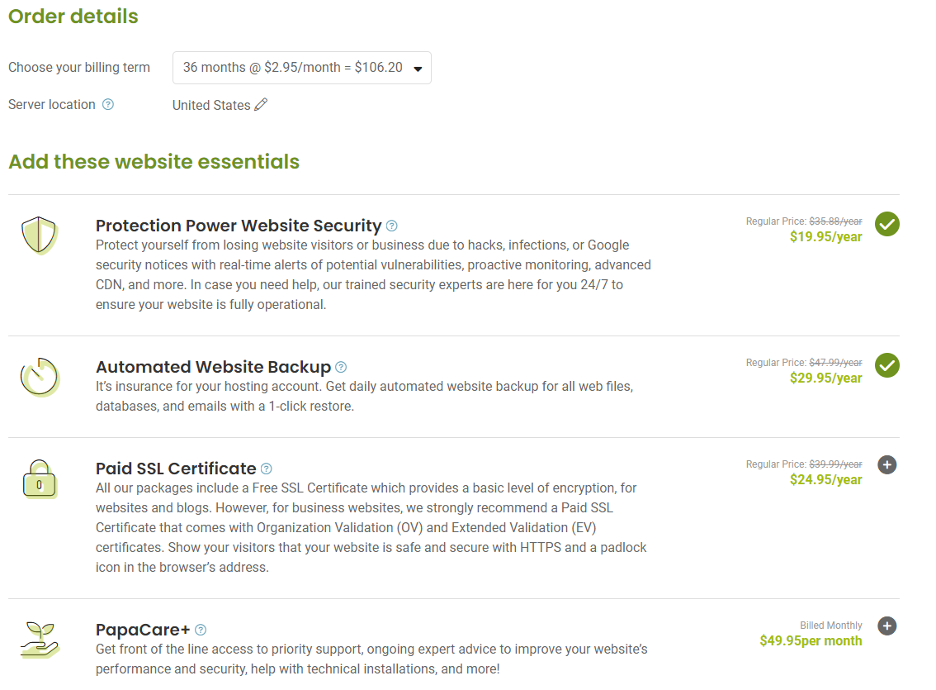
Who Is HostPapa For?
| Recommended For | Not Recommended For |
|---|---|
| Site owners looking for highly responsive, hands-on customer support | Users who need dedicated hosting for a growing site |
| Users who care about sustainability or eco-friendly host options | Customers looking for a packaged features list at a low price |
💡Read our full HostPapa Review for a complete feature comparison.
How To Choose a PHP Hosting Provider
What is the best PHP hosting provider for your website based on our expert recommendations? This depends on several considerations based on your current website plans and future growth goals. For your own PHP website or application, consider:
- If a hosting provider has built-in PHP support in a standard hosting plan
- The kind of site you want to maintain (informational, ecommerce, blog, etc.)
- Add-on features that would boost or enhance site maintenance
- Whether the provider’s data centers are central to markets that you plan to target
- The level of customer support or 24/7 access you require to run a site
- Overall budget, both now and in the future (since many plans extend multiple years)
We hope that the key features, price points, benefits, and downsides in this overview will enable you to find the perfect PHP host.
Doesn’t PHP Hosting Come Standard with Providers?
No, not necessarily! PHP hosting isn’t automatically included with every web hosting provider, even those that are most popular among developers. Although PHP is widely supported, not all hosting plans include built-in support to run PHP scripts.
Take time to review the features and specifications of a hosting plan before purchasing or signing up for a lengthy contract. This ensures that your hosting provider supports PHP scripts, whether you use them now or in the future. You’ll also need to check for compatibility with the specific version of PHP that you use or plan to upgrade to.
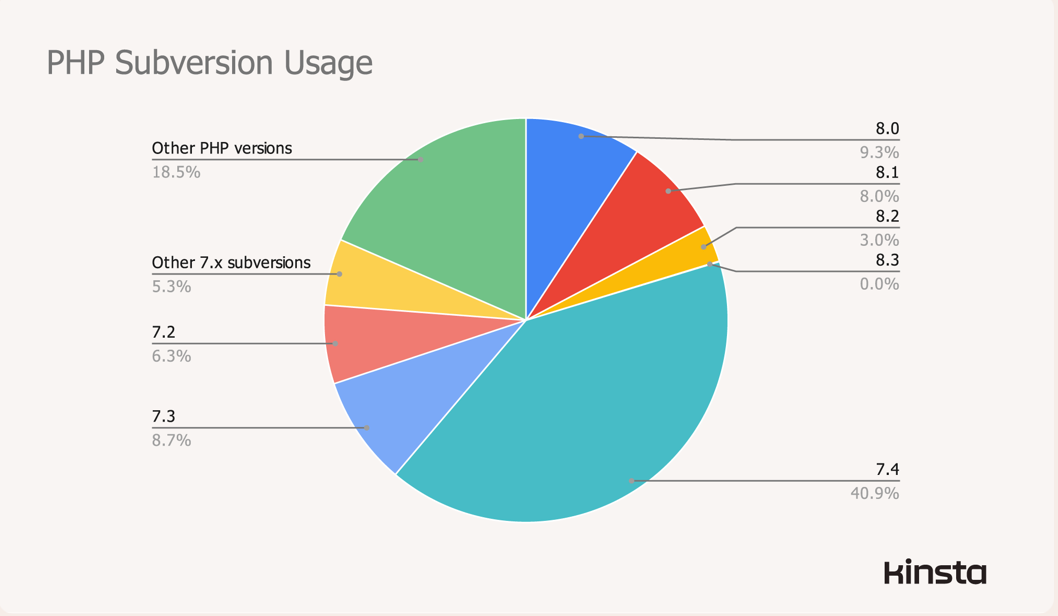
How We Test Hosting Providers
Our rigorous testing process means that we score and rate each product in five main categories of investigation and 30 subcategories. In total, we cover 282 points of comparison – and we go through this process for every type of hosting the provider has to offer!
Our main testing categories for hosting providers are:
- Price: the cost associated with the hosting services provided by a hosting provider, such as subscription plans, pricing tiers, and any additional fees or charges.
- Performance: the speed, reliability, and overall performance of a hosting provider’s servers. It encompasses factors such as server uptime and response time.
- Features: the specific functionalities and capabilities provided by a hosting provider, including storage space, bandwidth allocation, and server location.
- Help and Support: the assistance and resources available to users when they encounter issues or need guidance, e.g. tutorials and email or chat support.
- Market Analysis / Customer Score: the assessment of the hosting provider’s position and reputation in the market.
The Website Builder Expert product testing process
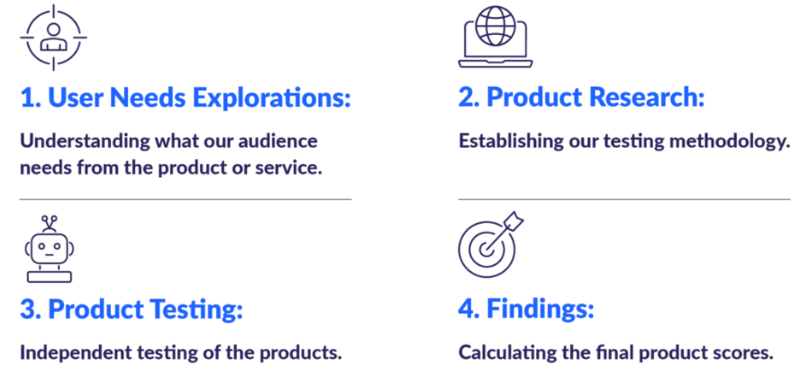
Best PHP Hosting Providers: Final Thoughts
Bluehost is our preferred well-rounded provider, offering customizable PHP versions that are both power-packed and affordable. If you’re after a budget-friendly provider, give Hostinger a spin. And if scalability is your top priority as an experienced WordPress user, don’t miss the benefits of WP Engine.
To summarize, there’s no shortage of options when it comes to reliable PHP web hosts, but the decision ultimately comes down to what you value most in a provider. Do you have extra resources to invest? Do you need help with upgrading PHP versions? Or are you in search of extra security layers to protect your site’s growth?
We’ve analyzed the best of the best to help you make the right choice for your personal or business needs. Bluehost is our preferred well-rounded provider, offering customizable PHP versions that are both power-packed and affordable. If you’re after a budget-friendly provider, give Hostinger a spin. And if scalability is your top priority as an experienced WordPress user, don’t miss the benefits of WP Engine.
Leave a comment